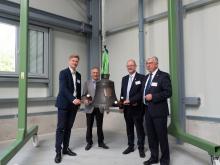Last week, the Centre for Climate-Neutral Metallurgical Thermal Processes was opened in Freiberg: With this new technical centre, scientists at TU Bergakademie Freiberg are investigating how energy-intensive processes that are currently powered by natural gas can be supplied with energy using renewable methods. They are focussing primarily on the melting of metals, but also on the ceramics and glass industries. One way of making these processes greener is electrification. Ideally, the necessary energy is supplied by electricity from renewable sources.
"With the new centre for climate-neutral metallurgical thermal processes, we want to find solutions now for the current challenge of many industries that want to replace natural gas as an energy source in the near future. Our goal is emission-free thermal processes that we optimise through a closed-loop system," says Professor Gotthard Wolf, Head of the Foundry Institute at TU Bergakademie Freiberg.
In order to get closer to this goal, two technologies have already been developed at TU Bergakademie Freiberg that could replace natural gas burners in the future. By using green electricity, the process step of melting aluminium, for example, becomes completely CO2-free. These are a plasma-heated hot gas torch and an induction-heated hot gas torch. "Each of the electrically operated torches could be replaced in existing melting furnaces without the mostly medium-sized foundries having to invest in alternative furnaces," explains Prof Gotthard Wolf.
The team now wants to further test the two technologies in the new technical centre on the TU Bergakademie Freiberg campus and check their application together with industrial partners. The construction of the new technical centre, which cost around 1.3 million euros, was made possible by the university and the Foundry Institute's own funds.
